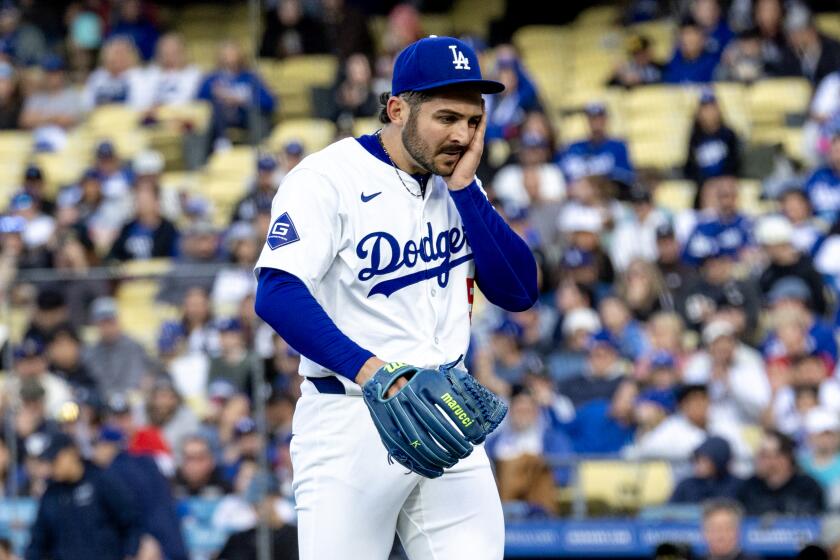Commissioners walk a fine line
The commissioner felt as if he had no choice.
One of his teams, situated in a major market, could not make payroll. The owner simply did not have the cash, so the league took over.
If this sounds like a recap of the current Dodgers drama, it isn’t.
This scenario occurred in 2008 when the NHL assumed control of the Phoenix Coyotes, then fought owner Jerry Moyes in court to prevent him from selling to a Canadian businessman who might have moved the franchise north.
Commissioner Gary Bettman insisted he was trying to protect the stability of the game in much the same way that a fellow commissioner, Bud Selig, recently invoked “the best interests of baseball” when he appointed a representative to oversee the Dodgers’ day-to-day operations.
Whenever commissioners take drastic action against an owner, the question arises: Who truly runs the major sports leagues?
While commissioners rule from on high, they are hemmed in on one side by players unions and collective bargaining agreements. On the other side stand the men who gave them their jobs in the first place.
“The biggest fallacy in the public view is the widespread belief that the commissioner can basically do anything he wants,” said Fay Vincent, who preceded Selig as the head of baseball. “You have to remember the commissioner works for the owners.”
Perhaps the public’s misperception dates to America’s first famous commissioner.
In the early 1900s, the National League and American League presidents ran baseball along with a third party of their choosing. This select committee never accomplished much because its members could never agree on anything.
Then came the 1919 Black Sox scandal. After Chicago White Sox players were accused of throwing World Series games, the sport turned to Kenesaw Mountain Landis, a tough-minded federal judge, to restore credibility.
“You have told the world that my powers are to be absolute,” he warned the owners. “I wouldn’t take this job for all the gold in the world unless I knew my hands were free.”
Landis subsequently banished eight White Sox players -- including “Shoeless” Joe Jackson, one of the greatest hitters of all time -- and tossed the president of the Philadelphia Phillies out of baseball for betting on games. He suspended Babe Ruth for 40 games for barnstorming without permission and battled with Branch Rickey over improprieties in the St. Louis Cardinals’ farm system.
“I think he set the ideal that other commissioners wanted to strive for,” said Richard Crepeau, a sports historian at the University of Central Florida. “People looked at his power and wanted to emulate it.”
When an early pro football commissioner, Joe Carr, discovered the Milwaukee Badgers had used four high school players in 1925, he levied a $500 fine that led to the team’s demise. Later, Carr hit the dean of the game, George Halas, with a $1,000 fine after the Chicago Bears improperly signed a fullback who had left Notre Dame before graduating.
The scope of the commissioner’s power -- as it has developed over the years -- varies from sport to sport. The NHL does not have a “best interests” clause as baseball does, a league spokesman said. The NFL and NBA do.
That might explain NBA Commissioner David Stern’s comment after he suspended Ron Artest, then of the Indiana Pacers, for the remainder of the 2004-05 season, punishment for his role in a melee in the stands at Detroit.
Asked about the decision-making process that led to the penalty, Stern replied: “It was unanimous. 1-0.”
But disciplining players -- even with potential opposition from the union -- is one thing. Invoking the “best interests” clause against owners is another.
Instances in which commissioners have directly opposed owners have been infrequent at best.
According to Hall of Fame research, no owner has been forced out of baseball since 1912, when Horace Fogel of the Philadelphia Phillies was banished for repeatedly impugning the integrity of umpires and opponents. That was before Landis came along.
Major League Baseball, the NBA and the NHL have since interceded with a number of beleaguered franchises, but usually with the owners’ consent.
In the Dodgers’ case, while Selig seemed to be acting unilaterally, behind the scenes he had the backing of select owners on an executive committee. With the league appointing a trustee and announcing an investigation into the club’s finances, battle lines were quickly drawn.
Dodgers owner Frank McCourt insisted there would be no cause for action if Selig simply approved a $3-billion television contract between his team and Fox; Selig has said repeatedly that he wants to complete the investigation first.
Without the deal, people with knowledge of the situation have said, the Dodgers will not be able to meet payroll at the end of the month.
That would open the door for baseball to take full control of the team. McCourt has implied that he would seek legal remedy even though owners sign an agreement promising not to sue the league or its commissioner.
Vincent faced a somewhat similar challenge in 1992 when owners went to court to block his proposed division realignment.
“I remember [White Sox owner] Jerry Reinsdorf telling me, ‘I hate commissioners. You guys are supposed to be out there making money for us,’ ” Vincent recalled.
Years earlier, Oakland Athletics owner Charlie Finley had lost a courtroom skirmish against then-commissioner Bowie Kuhn. That time, a federal judge sided with the owners and issued a preliminary injunction.
“Even though the lawyers will tell you the ‘best interests’ clause is a powerful grant of authority,” Vincent said, “courts have a way of looking at things very differently.”
Selig has been down this road before. In 1999, he pressured Marge Schott to sell the Cincinnati Reds after she was suspended twice for praising Adolf Hitler and uttering racial slurs.
The NFL has also seen open battles between commissioner and owner -- a series of disagreements resulted in lawsuits pitting the league against Raiders owner Al Davis, with each side winning its share.
It seems that commissioners in all sports have preferred to focus on marketing, dealing with labor issues and helping to negotiate lucrative broadcast deals. That usually entails building a consensus among owners, not confronting them.
“The commissioner’s role changed once you had players unions ... and TV came along with advertising,” said Linda Borish, an associate professor of American Studies at Western Michigan University who has written about sports.
So the standoff between Selig and McCourt plays out against a historical backdrop. Consider that Landis eventually left the game after fighting with owners and, decades later, Vincent was forced out by a no-confidence vote.
“I cannot govern as commissioner without the consent of owners to be governed,” he wrote in his resignation letter.
With the possibility of McCourt filing suit, Crepeau said Selig might need to call upon one of his strengths -- gathering enough support among owners to win a three-fourths vote and force McCourt out by way of “involuntary termination.”
“A commissioner has to be very good at dealing with owners, very aware of the legal and political environment around him,” the historian said. “If he isn’t, he will not be around very long.”
--
twitter.com/latimeswharton
More to Read
Are you a true-blue fan?
Get our Dodgers Dugout newsletter for insights, news and much more.
You may occasionally receive promotional content from the Los Angeles Times.







